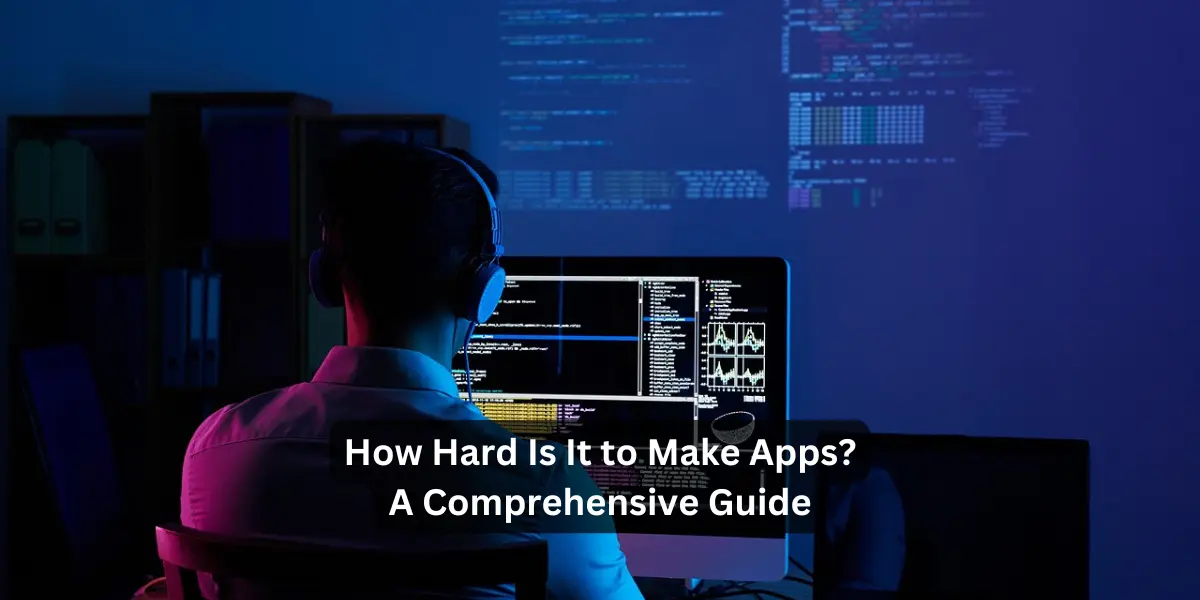
How Hard Is It to Make Apps? A Comprehensive Guide
Table of Contents
Table Of Content
- How hard is it to make apps: Introduction
- Understanding the Basics of Developing an App
- Skills Required
- Right Tools and Platforms for Mobile Application Development
- Development Platforms
- Programming Languages
- Design Tools for Your App
- Back-End Development
- Testing the App
- Conclusion: How Hard is it to Make Apps
- Frequently Asked Questions (FAQs)
How hard is it to make apps: Introduction
Making an app often sounds very intriguing. Actually, it looks pretty complicated sometimes. There are a number of stages required starting from planning and designing, through coding and testing. So, how long does it take to make apps? It is determined by your skills, the tools you use, and how complicated you want the app to be. Let’s take a closer look at what’s involved in creating an app.
Understanding the Basics of Developing an App
An application is the design of software for mobile phones, tables, or PCs. In simplest form, here are the main steps in a nutshell:
- Planning the App: What will the application do? Who needs to use it? How will it look? You develop a list of features and functions you’ll include in the app.
- You design the application: This is made up of the layout, buttons, color choices, and overall user experience, or UX. A good design will make the apps easy to use.
- Writing Code: This step is actually real development of the application where you build the application using programming languages, including Java, Swift, or Kotlin. And this step will require technical knowledge but can be learned through online courses or tutorials.
- Testing the App: Following the design, you test the app. Here, you will check for bugs or other issues that may affect its functionality.
- Launch on Live: Once you have tested everything and verified that the app works perfectly, it is launched on app stores such as Google Play or Apple’s App Store, from where people download and use.
- Development of an application can prove to be a tough task; however, breaking it down into these small steps will make it easier to understand and start working upon.
Moreover, if you are a newbie in the field, there is a lot to learn as you progress with the varied numerous resources available!
Skills Required
There are a range of skills involved in building apps from technical knowledge to creativity. Here are the main ones:
- Programming languages: To write codes for your app, learn programming languages like Java for Android, Swift for iOS, or JavaScript for web applications. Each language is applied to build different types of apps.
- Designing the App: What makes an app friendly? That goes back to designing the app’s interface and knowing the meaning of layout, color schemes, and how people will use the app.
- Problem-Solving: Bugs and Need for Improvements While you are building your app, odds are that you have a whole multitude of issues that need resolution, from bugs needing fixing to improvements of features. No question that good problem-solving skills to ensure that everything works.
- Knowing App Development Tools: There are tools like Android Studio or Xcode, which help in designing, testing, and publishing the apps. How to contact them is a vital part of how to develop an app.
- Testing and Debugging: Testing the app is basic towards the identification of bugs and rectification. Understanding how to debug as well as improve the performance of the app is also essential.
- User Experience (UX) and User Interface (UI) Design: These skills refer to how the design will look and, at the same time, how easy it will be to use. User Experience/UI ensures that the user is not confused while navigating the app.
Some skills seem to be rather complex on initial inspection but could be learned through a succession of online tutorials and practice. For beginners, building small apps often precedes larger apps.
Right Tools and Platforms for Mobile Application Development
The selection of proper tools and platforms will make the app development process easier and efficient. This is the way you can decide on that.
- Development Platforms
- Programming Languages
- App Designs for Tools
- Backend Development
- App Testing Tools
Development Platforms
- Android : Use Android Studio for developing apps for use on an Android device. Free, very popular.
- iOS: Apple provides its own official tool for iPhone or iPad apps; Xcode is free but requires a Mac.
- Cross-Platform: There are certain tools available such as Flutter, React Native, and Xamarin, that will enable a developer to have an app that supports both Android and iOS; these tools allow the coding to be done once and deployed on both platforms.
Programming Languages
- For Android, you will be more or less using Java or Kotlin.
- For iOS, you’ll be using Swift.
- JavaScript and frameworks like React Native or Ionic are used in many cases where a cross-platform app is to be developed.
Design Tools for Your App
- If you want to design your app interface first before even writing code, you’ll want to use Figma and Adobe XD.
- Sketch is another popular tool among developers for friendly designs.
Back-End Development
- If your application demands a server or database, you will need back-end tools such as Node.js, Django, or Ruby on Rails.
- Alternatively, you can use cloud services like Firebase or Amazon Web Services so that you don’t have to build a server in-house.
Testing the App
- The app can be now tested on different devices without the release with the help of testing tools like TestFlight for iOS and Firebase Test Lab for Android.
- One of the good things about Appium is that it supports multi-platform testing.
App selection depends on the needs of your app, the target platform and how much you are comfortable with the differential technologies. You will build your app from scratch and start experimenting gradually.
Conclusion: How Hard is it to Make Apps
Building an app is certainly no cakewalk, but with the right tools, skills, and knowledge, the process becomes truly manageable. Some of the key success steps include acquiring the basics of developing an app, acquisition of the required programming languages, and selection of the right platforms, Challenges will be there along the way, but surely, if persistence and practice are applied correctly, anyone can start creating apps. Whatever you are making from the most basic application to something more complex, there are numerous tools and resources that can come to life with your ideas.
Frequently Asked Questions (FAQs)
If a person is dedicated enough and has the right resources. Start with basic programming using easy-to-follow tutorials and build up to small projects.
There is no fixed time for creating an app. It can take just a few months to a year, depending on the amount of time that you dedicate to learning and how complex an application might be. Beginners generally begin with simple apps and move on to advanced applications as their skills improve.
App development is quite lucrative. Its profitability depends on variables like the popularity of the app, business models like ads, in-app purchases, or subscriptions, and the demand for a product. Many apps are money-makers, but only with time and perseverance.




